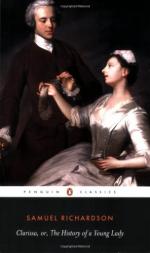And this I will prove demonstrably by a case, which, but a few hours ago, I put to Lord M. and the two Misses Montague. This it is:
Suppose A, a miser, had hid a parcel of gold in a
secret place, in order
to keep it there,
till he could lend it out at extravagant
interest.
Suppose B, in such a great want of this treasure,
as to be unable to live
without it.
And suppose A, the miser, has such an opinion of B,
the wanter, that he
would rather lend
it to him, than to any mortal living; but yet,
though he has
no other use in the world for it, insists upon very
unconscionable
terms.
B would gladly pay common interest for it; but would
be undone, (in his
own opinion at
least, and that is every thing to him,) if he
complied with
the miser’s terms; since he would be sure to
be soon
thrown into gaol
for the debt, and made a prisoner for life.
Wherefore guessing
(being an arch, penetrating fellow) where the
sweet hoard lies,
he searches for it, when the miser is in a
profound sleep,
finds it, and runs away with it.
[B, in this case, can only be a thief, that’s plain, Jack.]
Here Miss Montague put in very smartly.—A thief, Sir, said she, that steals what is and ought to be dearer to me than my life, deserves less to be forgiven than he who murders me.
But what is this, cousin Charlotte, said I, that is dearer to you than your life? Your honour, you’ll say—I will not talk to a lady (I never did) in a way she cannot answer me—But in the instance for which I put my case, (allowing all you attribute to the phantom) what honour is lost, where the will is not violated, and the person cannot help it? But, with respect to the case put, how knew we, till the theft was committed, that the miser did actually set so romantic a value upon the treasure?
Both my cousins were silent; and my Lord, because he could not answer me, cursed me; and I proceeded.
Well then, the result is, that B can only be a thief; that’s plain.—To pursue, therefore, my case—
Suppose this same miserly A, on awaking and searching
for, and finding
his treasure gone,
takes it so much to heart that he starves
himself;
Who but himself is to blame for that?—Would
either equity, law, or
conscience, hang
B for a murder?
And now to apply, said I——
None of your applications, cried my cousins, both in a breath.
None of your applications, and be d——d to you, the passionate Peer.
Well then, returned I, I am to conclude it to be a case so plain that it needs none; looking at the two girls, who tried for a blush a-piece. And I hold myself, of consequence, acquitted of the death.
Not so, cried my Lord, [Peers are judges, thou knowest, Jack, in the last resort:] for if, by committing an unlawful act, a capital crime is the consequence, you are answerable for both.




